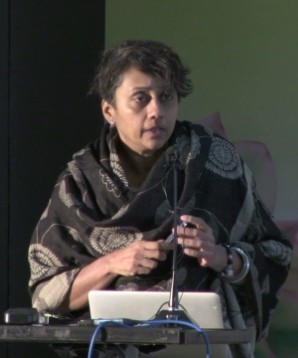Mental health advocate asserts that food intake directly impacts mental health.

A 56-year-old Indian lady dedicated her complete life to address the concerns and issues of mental health sufferers. She has been striving hard to fill the gaps in the mental health system in India by getting into the loop, the concept of human rights. While mental health impairment cases are dealt conventionally with practices such as shock treatment, confinement to mental asylums etc., she stresses the need to develop a patient-centric treatment. Let's know more about India's zealous mental health advocate, Dr. Bhargavi Davar who founded the Bapu Trust to address the challenges in the sphere of the Indian mental health system.
A Pathetic Childhood:
Bhargavi had a childhood that no child should even dream about. Her mother fell prey to mental health issues and Bhargavi saw her being confined to mental hospitals, undergoing conventional treatment. Amidst all this, Bhargavi never enjoyed the fruits of childhood. She was made to feel ashamed for what her mother was going through and was constantly humiliated making her feel inferior and isolated. Her encounter with the pathetic psychiatric institutions gave her nothing but the picture of insensitive and inhuman practices in the name of treatment. "I lost my mother to psychiatric institutions. I did not live a normal life like other children. I was haunted by these memories, wondering why such institutions and spaces exist.” she shared. Eventually, after going through years of trauma and self-shame, Bhargavi realized that she was not the only person with "early childhood mental institution trauma".
The Trust - A Promise of Inclusiveness:
All her experiences and close encounters with the psychiatric institutions lead her to take a decision on doing something to change the face of the mental health system in India. She founded the Bapu Trust for Research on Mind and Discourse, after her mother, in 1999. This trust took birth from Davar watching her mother suffer from psychosis and abuse in mental health institutions. The main objective of the trust is to combine two spheres of mental health curing viz. the non-medical healing and social justice practice. The trust firmly believes and stands upon the pillars of contemporary healing arts and disability thinking, arts-based therapy and the United Nations Convention on the Rights of Persons with Disability.
Through this trust, Bhargavi ensures the dignity of the mental health victims is maintained. The trust works towards reforming outdated laws and targets failed institutions. Under this trust, medical centres that heal patients through the power of self-reliance and community support are run. Bhargavi had also written several articles based on this in medical journals. Her books also aim at spreading awareness of mental health and highlight the loopholes in Indian medical as well as the legal system. Her publications include Mental Health from a Gender Perspective, released in 2001, Psychoanalysis as a Human Science: Beyond Foundationalism (1995),
Mental Health of Indian Women (1999). Om the whole her work, be it through a trust or through her writings addresses the gaps in human rights of people with mental illnesses.
An Effective Model:
When HRW mentioned her model of community-based treatment and care is highly effective as compared to conventional institutionalization in India, it does mean it. The Bapu Trust works in the slums of Pune and has experimented with many inclusive designs for mental health. "We have researched countries in Asia that focus on social systems and community lives, not individual lives. Communities come together during loss or grief such as the death of a child, a failed marriage,” she explains. The Trust's programs in Pune include significant lifestyle changes such as a better diet, meditation, exercise, friends and peers, focus on thoughtfulness and on maintaining peace. Trust believes in an eight-point recovery framework that covers several life domains. "I believe that if it leads to change in the slums of Pune, the Indian middle class has a lot more resources available,” she says. Bhargavi says that they strive hard to build a community system that gives importance to psychosocial well-being. This system sends workers into the slums who go door-to-door looking for people suffering from mental illness. Bapu Trust tells community members to identify people with mental illnesses. It also tries to make family members and neighbours aware of the fact that mental illness is no evil.
In The Days To Come:
Bhargavi says that when they were ratified by the UN Convention on the rights of people with disabilities, it gave them confidence that they are moving in the right direction. She says that going forward, the trust must focus on broadening the work of building communities and to empower them to become the first line of partnership in mental health care. "We have to overcome the limitations of our postcolonial identity. I imagine, vibrant, peace-loving, caring and inclusive communities. It’s a vision to live for.", she says.
Words of Value:
Bhargavi says that if someone is thinking about mental health, they should first think about what goes into their tummy. Diet is the most important factor that determines a person's mental health. She urges people not to underestimate the role of diet. "The brain is an organ and it needs nourishment. Focus on how your food is produced, how you consume it. Eat brain-friendly food, think about what goes in your body.", she concludes.
Kudos to the work of this lady that includes research, training, and dialogue platforms in addressing the mental health concerns. May her work reach out to every person in need.
If you Like to contribute to this Page, Please Drop us a Mail.
hello@bookofachievers.com

















